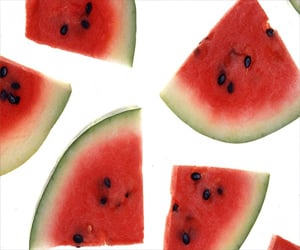- Watermelon seeds, whether black or white, are safe to eat and offer nutritional benefits like iron and folate
- Incorporating watermelon seeds into your diet can be done through roasting, adding to salads, or making butter
- Watermelon is not only hydrating but also aids in weight loss and supports overall health due to its low-calorie count and nutrient richness
Watermelon, a quintessential summer treat, often prompts questions about the safety and benefits of consuming its seeds. Despite common misconceptions, eating watermelon seeds won’t result in a watermelon sprouting inside you. Whether they are black or white, watermelon seeds are harmless to ingest, with black seeds passing through the digestive system as insoluble fiber.
These tiny seeds pack a surprising nutritional punch, containing essential nutrients like iron, folate, and niacin (1). While generally safe for consumption, overindulgence may lead to digestive discomfort, particularly for those with sensitive digestive systems. However, sprouted or cooked watermelon seeds are easier to digest, ensuring optimal nutrient absorption.
Advertisement
Adding Watermelon Seeds to the Diet
Incorporating watermelon seeds into your diet can be a flavorful and nutritious addition. They can be roasted for a satisfyingly crunchy snack, added to salads or oatmeal for extra texture and nutrition, or even transformed into watermelon seed butter for a creamy spread. However, as with any food, moderation is key to prevent potential digestive issues.
Advertisement
Lose Weight with Watermelon
Watermelon itself is a fantastic ally for those seeking to shed extra pounds, thanks to its low calorie count, high water content, and fiber-richness. With just 46 calories per cup of diced watermelon and a water content of around 92%, it not only keeps you hydrated but also helps you feel full without adding excess calories (2). Additionally, its fiber content aids digestion and promotes a feeling of satiety, reducing the likelihood of snacking on unhealthy foods. Packed with essential vitamins and minerals like vitamins A and C, potassium, and magnesium, watermelon contributes to overall health while satisfying sugar cravings with its natural sweetness.
Advertisement
Health Benefits of Watermelon
As temperatures soar during the summer months, indulging in watermelon becomes not only a refreshing choice but also a smart one. Its high water content helps keep you hydrated and cool, making it an ideal snack for combating the heat. Furthermore, watermelon is rich in vitamins and antioxidants, which promote skin health and bolster the immune system, offering additional reasons to enjoy it during the warmer seasons (3).
For those who like gardening, watermelon seeds offer the potential to grow into thriving plants with proper care. After rinsing and drying them thoroughly, plant them in warm, moist soil and provide adequate space and support for the vines to flourish. With patience and nurturing, these seeds can sprout into vines that yield delicious, juicy fruits—a rewarding outcome for those who give them a chance to grow.
How to Choose the Perfect Watermelon?
When selecting the perfect watermelon, there are several factors to consider. Look for a creamy yellow spot on the bottom, indicating that it ripened in the sun, and ensure it feels heavy for its size, which indicates maximum juiciness. Give it a gentle tap; if it sounds hollow, it’s likely ripe. Opt for a symmetrical shape and avoid any bruises or cuts. Finally, check for a dried stem, which signals that it was picked at the right time for optimal flavor. By following these tips, you can ensure a sweet and satisfying watermelon experience every time.
References:
- Versatile Nutraceutical Potentials of Watermelon-A Modest Fruit Loaded with Pharmaceutically Valuable Phytochemicals
Manivannan A, Lee ES, Han K, Lee HE, Kim DS. Versatile Nutraceutical Potentials of Watermelon-A Modest Fruit Loaded with Pharmaceutically Valuable Phytochemicals. Molecules. 2020 Nov 11;25(22):5258. doi: 10.3390/molecules25225258. PMID: 33187365; PMCID: PMC7698065. - Effects of Fresh Watermelon Consumption on the Acute Satiety Response and Cardiometabolic Risk Factors in Overweight and Obese Adults. Nutrients
Lum T, Connolly M, Marx A, Beidler J, Hooshmand S, Kern M, Liu C, Hong MY. Effects of Fresh Watermelon Consumption on the Acute Satiety Response and Cardiometabolic Risk Factors in Overweight and Obese Adults. Nutrients. 2019 Mar 12;11(3):595. doi: 10.3390/nu11030595. PMID: 30870970; PMCID: PMC6470521. - Watermelon lycopene and allied health claims
Naz A, Butt MS, Sultan MT, Qayyum MM, Niaz RS. Watermelon lycopene and allied health claims. EXCLI J. 2014 Jun 3;13:650-60. PMID: 26417290; PMCID: PMC4464475.
Source-Medindia



